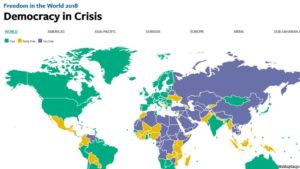 The relative weakness of some Western leaders appearing at the World Economic Forum in Davos reflects the recent fragmentation of electoral support on which democratic leaders rely, unlike in more authoritarian systems, Bloomberg’s Marc Campion writes:
The relative weakness of some Western leaders appearing at the World Economic Forum in Davos reflects the recent fragmentation of electoral support on which democratic leaders rely, unlike in more authoritarian systems, Bloomberg’s Marc Campion writes:
But it also exposes how liberal democratic institutions are themselves withering, amid what Eurasia Group’s Ian Bremmer calls a geopolitical depression. Those challenges were accumulating long before U.S. President Donald Trump’s election to the White House, he said.
 “It’s no one individual’s fault,” said Bremmer, founder and president of the New York-based political risk consultancy. It’s “astonishing” that the strongest leaders of advanced democracies in 2018 should be from hitherto stagnant France and geopolitically reticent Japan, he said. And as many western powers turn inward, China in particular is filling the vacuum.
“It’s no one individual’s fault,” said Bremmer, founder and president of the New York-based political risk consultancy. It’s “astonishing” that the strongest leaders of advanced democracies in 2018 should be from hitherto stagnant France and geopolitically reticent Japan, he said. And as many western powers turn inward, China in particular is filling the vacuum.
“They have a strategy,” said Bremmer. “We don’t.”
Liberal democracies are suffering from a deficit of legitimacy not seen since World War II, and today’s leaders have largely abandoned civil society and common values, Eurasia Group says in its annual assessment of top geopolitical risks. The breakdown in norms opens the door to a major event that could rock the global economy and markets.
As Princeton’s John Ikenberry argues in a recent article, the “US and its partners built a multi-faceted and sprawling international order, organised around economic openness, multilateral institutions, security co-operation and democratic solidarity”. This system won the cold war. That victory, in turn, promoted a global shift towards democratic politics and free-market economics. Today, however, the liberal international order is sick, notes FT analyst Martin Wolf:
 As Freedom in the World 2018, published by Freedom House, a US state-funded non-profit organisation, states, “Democracy is in crisis”. For the 12th consecutive year, countries that suffered democratic setbacks outnumbered those that registered gains. States that a decade ago seemed promising success stories — such as Turkey and Hungary — are sliding into authoritarian rule. Yet now, when potent authoritarian regimes challenge democracy, the US has withdrawn its moral support.
As Freedom in the World 2018, published by Freedom House, a US state-funded non-profit organisation, states, “Democracy is in crisis”. For the 12th consecutive year, countries that suffered democratic setbacks outnumbered those that registered gains. States that a decade ago seemed promising success stories — such as Turkey and Hungary — are sliding into authoritarian rule. Yet now, when potent authoritarian regimes challenge democracy, the US has withdrawn its moral support.
So why has this happened? The answer consists of changes in the world and in the domestic condition of countries, especially that of the high-income democracies, Wolf adds:
 Among global changes, the most important are the declining relevance of the west as a security community after the end of the cold war, together with its diminishing economic weight, especially in relation to China. Many Americans feel they have both less reason and less ability to be generous to erstwhile partners. Among domestic changes, many in high-income countries feel that the liberal global order to which their countries have been committed has done little for them. It is generating, instead, the sense of lost opportunities, incomes and respect. It may have brought vast gains to the sorts of people who frequent Davos, but far less to everybody else. Especially, after the shock of the financial crisis, the tide does not seem to be rising and, if it is, it is certainly not lifting all boats.
Among global changes, the most important are the declining relevance of the west as a security community after the end of the cold war, together with its diminishing economic weight, especially in relation to China. Many Americans feel they have both less reason and less ability to be generous to erstwhile partners. Among domestic changes, many in high-income countries feel that the liberal global order to which their countries have been committed has done little for them. It is generating, instead, the sense of lost opportunities, incomes and respect. It may have brought vast gains to the sorts of people who frequent Davos, but far less to everybody else. Especially, after the shock of the financial crisis, the tide does not seem to be rising and, if it is, it is certainly not lifting all boats.
Denizens of the liberal world order will have their say at Davos, the FT adds. German chancellor Angela Merkel and French President, as well as European Commission president Jean-Claude Juncker, will all get to make their case for global collaboration.
But the West still needs to confront two fundamental questions, Wolf adds:
- The first is which is the more important if it comes to a hard choice: domestic political cohesion or international economic integration? At the margin, it has to be the first. Economic life demands political stability. …
- The second is where to focus efforts at global co-operation. The answer must be that managing the global commons and maintaining global stability comes first.







